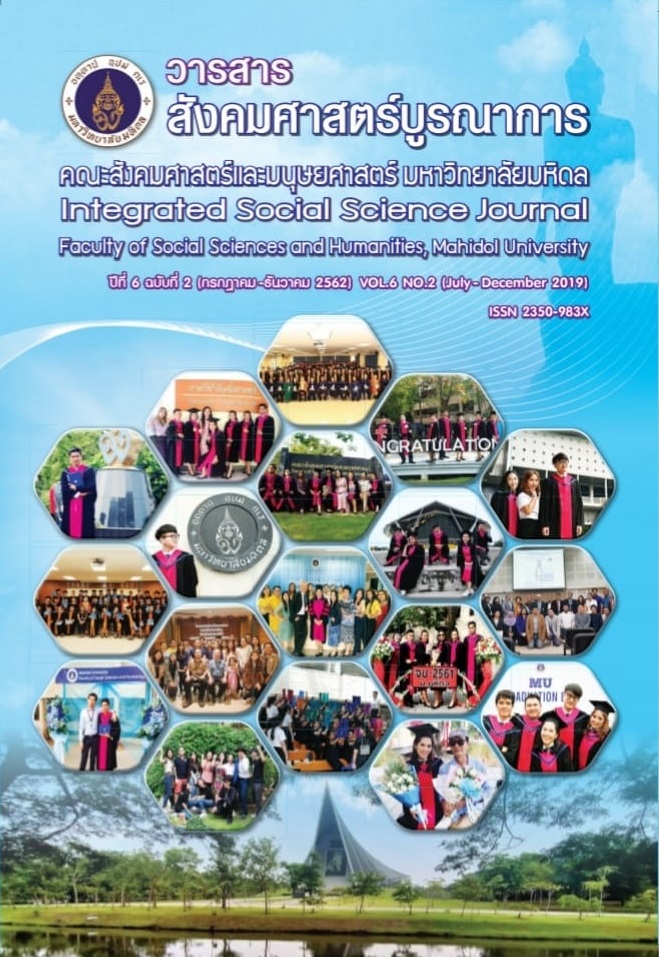Analysis of Generic Structure Developments and Resources of Intersubjective Stance in Discussion Essays Written by Thai EFL Students: Systemic Functional Linguistics and Appraisal Perspective
Main Article Content
บทคัดย่อ
This study aimed to analyse the generic structures of the student writers’ discussion essays, how the student writers construct their positions in the discussion essays and student writers’ the positions (disclaim, proclaim, entertain and attribute) in the discussion essays which were drawn from the second part of the genre based writing course of Integrated Advanced Reading and Writing Skills at the Faculty of Liberal Arts and Science, Kasetsart University, Thailand in the 2018 academic year. The study focused on the academic writing developments of the students emphasizing the argumentative discussion genre. During the course, the students wrote discussion essays of at least 1,200 words from the given topic. The analysis focused on 2 sample texts from 20 groups of the students from 6 classes and employed the engagement framework in the appraisal theory which was developed by Martin and White (2005) as the main framework to analyse all sample texts of the final written assignment. The findings of the analysis showed that most students can follow the generic structures of the discussion genre as identified in the Sydney genre based school effectively and they can also indicate their authorial positions and voices at the end of the texts by employing the proclaim feature of heteroglossia. In addition, in the introduction and body parts of the texts, they mostly used the attribute to invite others to endorse their attitudes and feelings. The study provides further understanding on how students construe their position, value and belief from attitudinal resources in their discussion essays. The study also suggests that future study should focus more on the issue of heteroglossia and monoglossia as identified in the appraisal theory which would help strengthen and develop students’ argumentative writing skills.
Article Details
- วารสารสังคมศาสตร์บูรณาการ มหาวิทยาลัยมหิดล อนุญาตให้สามารถนำไฟล์บทความไปใช้ประโยชน์และเผยแพร่ต่อได้ โดยอยู่ภายใต้เงื่อนไขสัญญาอนุญาต CC Attribution-NonCommercial-NoDerivatives 4.0 International (CC BY-NC-ND 4.0) โดยต้องแสดงที่มา/การอ้างอิงจากวารสาร – ไม่ใช้เพื่อการค้า – ห้ามแก้ไขดัดแปลงเนื้อหา
- ข้อความที่ปรากฏในบทความในวารสารฯ เป็นความคิดเห็นส่วนตัวของผู้เขียนแต่ละท่าน ไม่เกี่ยวข้องกับกองบรรณาธิการวารสารฯ (ซึ่งหมายรวมถึง บรรณาธิการ ผู้ทรงคุณวุฒิในกองบรรณาธิการ หรือ บรรณาธิการรับเชิญ) แต่อย่างใด ความรับผิดชอบองค์ประกอบทั้งหมดของบทความแต่ละเรื่องเป็นของผู้เขียนแต่ละท่าน หากมีความผิดพลาดใด ๆ ผู้เขียนแต่ละท่านจะรับผิดชอบบทความของตนเอง ตลอดจนความรับผิดชอบด้านเนื้อหาและการตรวจร่างบทความเป็นของผู้เขียน ไม่เกี่ยวข้องกับกองบรรณาธิการวารสารฯ
- กองบรรณาธิการขอสงวนสิทธิ์ในการตัดทอน/ปรับแก้ถ้อยคำบางประการเพื่อความเหมาะสม
References
Bathia, V. (1993). Analyzing Genres: Languages in Professional Settings. London. Longman.
Chang, P. (2010). Taking an effective authorial stance in academic writing: Inductive learning for second
language writers using a stance corpus.Unpublished Ph.D. Dissertation, University of Michigan, Ann Arbor.
Available from Dissertation and Theses database. Retrieved from http:hdI.handle.net/2027.42/77860.
Dobakhti, L. (2016). A Genre Analysis of Discussion Sections of Qualitative Research Articles in Applied Linguistics. Theory and Practice in Language Studies. Vol. 6, No. 7, 1383-1389, July 2016 DOI: http://dx.doi.org/10.17507/tpls.0607.08
Feez, S. (1998). Text-based syllabus design. Sydney, National Centre for English Language Teaching and Research (NCELTR).
Hood, S.(2004). Managing attitude in undergraduate academic writing: a focus on the introductions to research reports. In L.J.Ravelli, &R.A.Ellis (Eds.), Analysing academic writing:Contextualized frameworks, 24-44. London:Continuum.
Hood, S. (2006). The persuasive power of prosodies: radiating values in academic writing.Journal of English for Academic Purposes, 5, 37-49.
Kuiper, C., Smit, J., De Wachter, L.,&Elen, J. (2017). Scaffolding tertiary students’ writing in a genre-based writing intervention.Journal of Writing Research, 9(1),27-59. doi: 10.17239/jowr-2017.09.01.02
Knapp, P. and Watkins, M. (2005). Genre, Text, Grammar Technologies for Teaching and Assessing Writing. Sydney, University of New South Wales Press.
Kongpetch, S. (2006). Using a genre-based approach to teach writing to Thai students: A case study. Prospect 21(2), 3-33.
Krisnachinda, S. (2006). A case study of a genre- based approach to teaching writing in a tertiary context in
Thailand. Unpublished PhD Dissertation. University of Melbourne.
Martin, J. R. (1984). Language, Register and Genre. Geelong, Victoria, Deakin University.
Martin, J. R. (1992). Genre and Literacy-Modeling Context in Educational Linguistics.Annual
Review of Applied Linguistics v13,141-172.
Martin, J. R. (1997). Analyzing genre: Functional parameters. In F. Christie & J.R. Martin (Eds.), Genre and institutions: Social processes in the workplace and school.Open Linguistics Series, ed. R.F. Fawcett. London: Continuum. 3-39.
Martin, J. R. (2001). Language, Register and Genre. Analysing English in a Global Context. A. Burns and C. Coffin. London, Routledge.
Martin, J. R. and Rose, D. (2003). Working with Discourse. London, Continuum.
Martin, J.R. and White, P.R.R. (2005) The Language of Evaluation: Appraisal in English, Palgrave Macmillan.
Martin, J.R. and Rose, D. (2006) Working with Discourse : Meaning Beyond the Clause, Continuum.
Martin, J. R. and Rose, D. (2008). Genre Relations: Mapping Culture. London, Equinox.
Mingsakoon, P. and Srinon, U. (2018).Development of Secondary School Students' Generic Structure Execution in Personal Experience Recount Writing Texts through SFL Genre-Based Approach. Advances in Language and Literary Studies, v9, n6,1-8.
Pho, P. (2008). Research article abstracts in applied linguistics and educational technology: a study of linguistic
realizations of rhetorical structure and authorial stance.Discourse studies, 10, 231-250.
Srinon, U. (2011). A longitudinal study of developments in the academic writing of Thai university students in the context of a genre based pedagogy, Unpublished PhD Dissertation, University of Adelaide.
Srinon, U. (2017) .A study of Thai postgraduate students’ authorial voices in writing research proposal: systemic functional linguistics perspective.International Journal of Humanities and Social Sciences. Vol. 7, No. 9, 155-164.
Srinon, U. (2019). Analysis of Generic Structure Developments of Exposition Essays Written by Thai University Students: Sydney Genre - Based School and Systemic Functional Linguistics Perspectives, Veridian E-Journal, Vol. 12, No.1, 1173-1192.
Wingate, U. (2012) “Argument!’ helping students understand what essay writing is about”Journal of English for Academic Purposes, Volume 11, Issue 2, 145-154.

